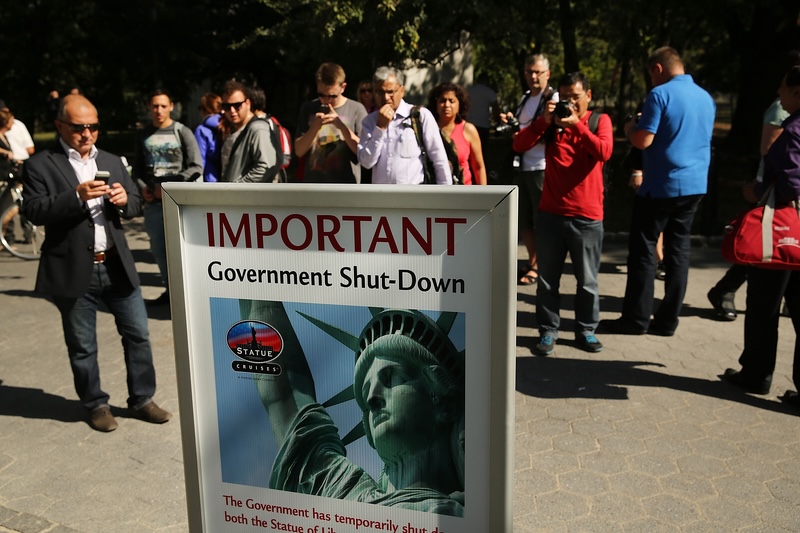
People in New York City look at a sign informing them that the Statue of Liberty is closed on Oct. 1, 2013, due to a government shutdown. (Photo by Spencer Platt/Getty Images)
WASHINGTON — The White House has sent guidance to departments and agencies, telling them that if a shutdown begins Wednesday, they’re expected to institute mass firings and layoffs.
The two-page memo, shared with States Newsroom by a Trump administration official, says any programs that received funding in the “big, beautiful” law will “continue uninterrupted.”
But the vast majority of federal departments and agencies need Congress to approve an annual funding bill or a stopgap spending bill before the start of the new fiscal year to keep running.
The memo says the employees who run those programs may receive a Reduction in Force notice if lawmakers don’t broker an agreement before the Oct. 1 deadline.
Those reductions will apply to programs, projects, or activities that are “not consistent with the President’s priorities,” according to the memo.
“RIF notices will be in addition to any furlough notices provided due to the lapse in appropriation,” the memo states. “RIF notices should be issued to all employees working on the relevant (programs, projects, or activities), regardless of whether the employee is excepted or furloughed during the lapse in appropriations.”
Once lawmakers reach a deal and the government reopens, the memo says agencies should rework their reduction in force plans “to retain the minimal number of employees necessary to carry out statutory functions.”
Employee union urges compromise
Senate Minority Leader Chuck Schumer, D-N.Y., wrote in a statement the memo represents “an attempt at intimidation.”
“Donald Trump has been firing federal workers since day one—not to govern, but to scare. This is nothing new and has nothing to do with funding the government,” Schumer wrote. “These unnecessary firings will either be overturned in court or the administration will end up hiring the workers back, just like they did as recently as today.”
American Federation of Government Employees National President Everett Kelley wrote in a statement the memo shows that White House budget director Russ Vought intends “to pursue another DOGE-like round of illegal mass firings in the event of a shutdown, adding to the chaos.”
“The truth is simple: Republicans cannot fund the government without Democratic votes. That means the only path forward is compromise,” Kelley wrote. “The president and congressional leaders must sit down and negotiate in good faith to keep the lights on for the American people. Nothing less is acceptable.”
Maryland Democratic Sen. Chris Van Hollen wrote in a statement that “Trump is engaged in mafia-style blackmail, with his threats ultimately harming the American people.”
“He is threatening to double down on the failed actions of Elon Musk and his chainsaw — going after patriotic civil servants that provide Americans with critical services — despite having to rehire many of these workers after Americans experienced the negative impact of those cuts,” Van Hollen wrote. “These dedicated workers have nothing to do with the ongoing political and policy disputes that have brought us to the brink of a shutdown.”
House GOP departs until after Oct. 1
The House voted mostly along party lines to approve a seven-week stopgap spending bill last week before leaving town. GOP leaders were supposed to bring lawmakers in that chamber back to Capitol Hill on Monday, but extended their break and won’t return until after the shutdown deadline.
The move was largely seen as a way to jam the Senate, specifically Democrats, with the short-term government funding bill that they largely oppose because GOP lawmakers wrote it behind closed doors without bipartisan negotiations.
The Senate tried to advance the House-passed Republican stopgap bill but didn’t have the necessary 60 votes to move the legislation toward final passage.
Democrats have maintained for weeks that if Republican leaders want their support on a short-term spending bill, they should have negotiated with party leaders on key issues, including an extension of the enhanced tax credits for people who buy their health insurance on the Affordable Care Act Marketplace.
Those tax credits are set to expire at the end of the year but Americans who rely on the marketplace for their health insurance will begin purchasing their plans for next year on Nov. 1.
Speaker Mike Johnson, R-La., has said he views negotiations on those tax credits as an issue for December, not this month, despite the open enrollment period ending on Dec. 15.
Senate Majority Leader John Thune, R-S.D., has said repeatedly he views the issue as separate from government funding.
Jeffries says Dems ‘ready, willing and able to have a conversation’
House Minority Leader Hakeem Jeffries, D-N.Y., said during a Thursday press conference that Democrats are “ready, willing and able to have a conversation to see if we can find common ground in a bipartisan way to reach a spending agreement that meets the needs of the American people.”
“Republicans have decided they don’t even want to have a conversation with Democrats to reach a bipartisan agreement. No one in America thinks that’s reasonable,” Jeffries said. “It’s an inherently unreasonable position — my way or the highway.”
Jeffries criticized Trump and Republicans for having unified control of government, but not taking action to lower costs for Americans, including on health care.
“Donald Trump promised to lower costs on day one. Costs aren’t going down in America, they’re going up. Inflation is going up,” Jeffries said. “Life has become more expensive under Donald Trump and Republican policies and that includes health care premiums, which are about to skyrocket.”
It would be “foolish,” he said, for Democrats to trust the Republicans will negotiate on the enhanced ACA tax credits later in the year, given their actions so far on health care.


![[Aggregator] Downloaded image for imported item #1146343](https://whitecounty.com/wp-content/uploads/2025/09/shutdown2013_0-696x464.jpg)



